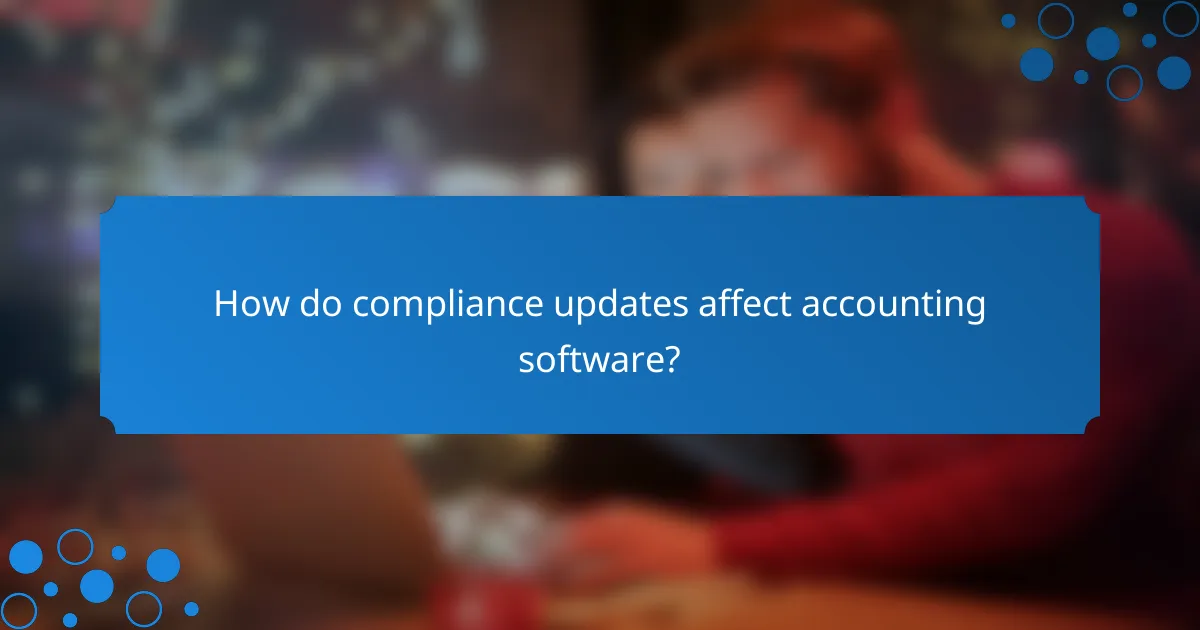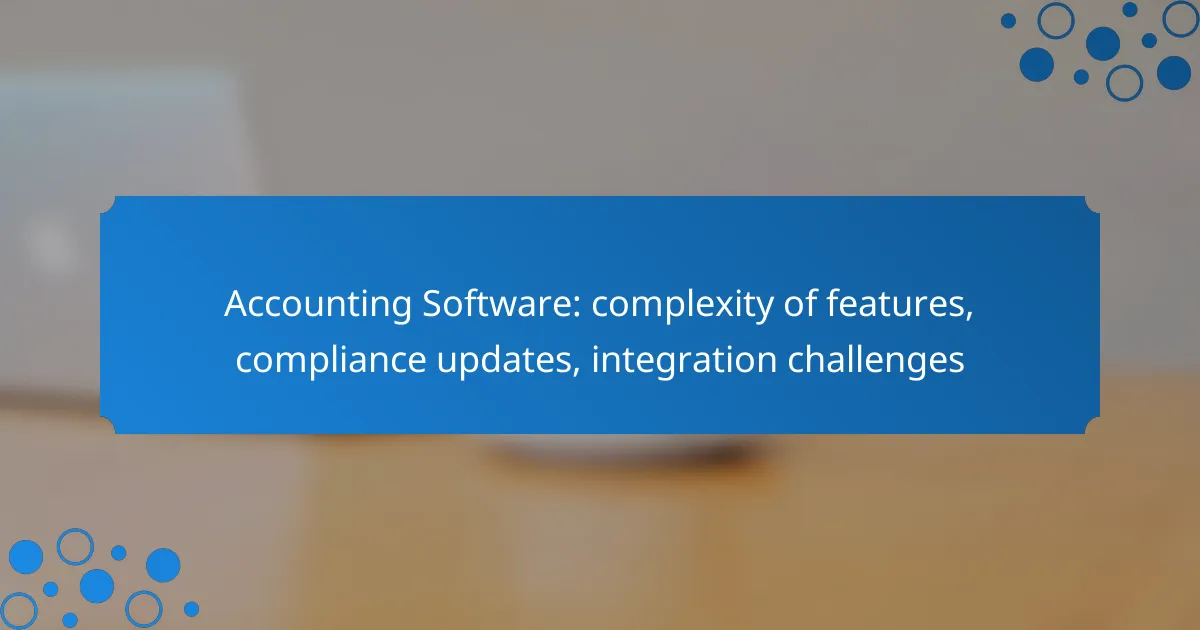Choosing the right accounting software is essential for businesses, as it encompasses a range of features that address compliance updates and integration challenges. Effective solutions like Xero, MYOB, QuickBooks, and FreshBooks not only streamline financial reporting but also ensure adherence to evolving regulations. However, users must navigate potential integration hurdles, such as compatibility with existing systems and data migration, to fully leverage these tools.

What are the best accounting software solutions in Australia?
The best accounting software solutions in Australia include Xero, MYOB, QuickBooks, and FreshBooks. These platforms offer a range of features tailored to meet the needs of various businesses, from compliance updates to integration capabilities.
Xero features and benefits
Xero is renowned for its user-friendly interface and comprehensive features, including invoicing, expense tracking, and bank reconciliation. It supports real-time collaboration, allowing multiple users to access financial data simultaneously.
Additionally, Xero offers a robust ecosystem of add-ons and integrations, enhancing its functionality. This makes it suitable for businesses of all sizes, particularly those that value flexibility and scalability.
MYOB capabilities and compliance
MYOB provides a suite of accounting tools designed to assist businesses with compliance and reporting requirements in Australia. Its features include payroll management, tax calculations, and BAS reporting, which are crucial for meeting local regulations.
MYOB also offers industry-specific solutions, making it a strong choice for businesses in sectors such as retail and construction. However, users should be aware of the learning curve associated with its more complex features.
QuickBooks integration options
QuickBooks is highly regarded for its extensive integration options, allowing businesses to connect with various third-party applications. This flexibility enables users to customize their accounting processes according to specific business needs.
Moreover, QuickBooks supports seamless data import and export, which can streamline workflows. Businesses should evaluate their existing tools to ensure compatibility and maximize efficiency when integrating with QuickBooks.
FreshBooks usability for small businesses
FreshBooks is particularly popular among small businesses due to its simplicity and ease of use. Its core features include invoicing, time tracking, and expense management, which are essential for managing finances effectively.
The platform also offers excellent customer support and a mobile app, making it convenient for business owners on the go. However, users should consider its limitations in advanced accounting features if they plan to scale their operations significantly.

How do compliance updates affect accounting software?
Compliance updates are crucial for accounting software as they ensure adherence to current regulations and standards. Regular updates help businesses avoid penalties and maintain accurate financial reporting.
Impact of ATO regulations on software
The Australian Taxation Office (ATO) regulations significantly influence accounting software functionality. Software must integrate features that support compliance with tax laws, including reporting requirements and data submission protocols.
Failure to comply with ATO regulations can result in fines and operational disruptions. Therefore, businesses should choose software that offers robust compliance tools and regular updates aligned with ATO changes.
Importance of real-time compliance updates
Real-time compliance updates are essential for keeping accounting software aligned with evolving regulations. These updates ensure that businesses can promptly adapt to changes, minimizing the risk of non-compliance.
Utilizing software that provides automatic updates can save time and reduce the burden on accounting teams. This proactive approach helps maintain accurate records and supports timely tax submissions.
Examples of recent compliance changes
Recent compliance changes include updates to GST reporting requirements and changes in payroll tax regulations. For instance, the introduction of Single Touch Payroll (STP) has altered how businesses report employee earnings and tax information.
Another example is the shift towards digital invoicing and e-Reporting, which many jurisdictions are adopting to streamline tax processes. Staying informed about these changes is vital for selecting the right accounting software that can accommodate new compliance needs.

What integration challenges do users face?
Users often encounter various integration challenges when using accounting software, which can hinder efficiency and data accuracy. Common issues include compatibility with existing systems, data migration difficulties, and the need for ongoing updates to maintain compliance.
Common integration issues with Xero
Xero users frequently face integration challenges related to third-party applications. These can include limited functionality of add-ons, issues with data syncing, and discrepancies in reporting due to mismatched data formats. Ensuring that all integrated applications are compatible with the latest version of Xero is crucial for seamless operation.
Additionally, users should be aware of the API limitations that may restrict the depth of integration. Regularly reviewing integration settings and updating connected apps can help mitigate these issues.
MYOB API limitations
MYOB users often encounter API limitations that can restrict their ability to integrate with other software. These limitations may include a lack of support for certain data types or restricted access to specific functionalities, which can complicate workflows. Users should carefully evaluate the API documentation to understand these constraints before attempting integration.
To optimize integration with MYOB, consider using middleware solutions that can bridge gaps between MYOB and other applications. This can enhance data flow and reduce manual entry errors.
QuickBooks third-party app compatibility
QuickBooks users may experience compatibility issues with third-party applications, which can lead to data inconsistencies and operational delays. It’s essential to verify that any app intended for integration is certified by QuickBooks to ensure proper functionality and support.
Regularly updating both QuickBooks and third-party applications can help maintain compatibility and improve performance. Users should also monitor user reviews and feedback on integrations to identify potential issues before implementation.

What criteria should be considered when selecting accounting software?
When selecting accounting software, consider factors such as scalability, cost-effectiveness, and customer support. These criteria ensure that the software meets current needs while being adaptable for future growth and providing necessary assistance.
Scalability for growing businesses
Scalability is crucial for businesses anticipating growth. Choose software that can handle increasing transaction volumes and additional users without performance issues. Look for solutions that offer tiered pricing or modular features that can be added as your business expands.
For example, a small business might start with basic invoicing features, but as it grows, it may need advanced reporting or multi-currency support. Ensure the software can accommodate these changes without requiring a complete overhaul.
Cost-effectiveness and pricing plans
Cost-effectiveness involves evaluating both upfront costs and ongoing expenses. Compare pricing plans to find one that aligns with your budget while providing essential features. Many providers offer monthly subscriptions, which can range from low tens of USD to higher amounts depending on the features included.
Consider hidden costs such as transaction fees, support charges, or costs for additional users. A clear understanding of total ownership costs will help avoid surprises and ensure the software remains within your financial plan.
Customer support and resources
Reliable customer support is vital for resolving issues quickly and minimizing downtime. Look for software that offers multiple support channels, such as phone, chat, or email, and check for user reviews regarding responsiveness and helpfulness.
Additionally, consider the availability of resources such as tutorials, webinars, and community forums. These can enhance your understanding of the software and help you maximize its features, ultimately improving your accounting processes.

What are the emerging trends in accounting software?
Emerging trends in accounting software focus on enhancing efficiency, compliance, and integration capabilities. Key developments include the rise of AI and automation, as well as the shift towards cloud-based solutions that support remote work.
AI and automation in accounting
AI and automation are transforming accounting by streamlining repetitive tasks and improving accuracy. These technologies can handle data entry, transaction categorization, and even complex financial analysis, allowing accountants to focus on strategic decision-making.
When considering AI tools, look for features that integrate seamlessly with existing systems and comply with relevant regulations. For example, some platforms offer automated compliance updates to ensure adherence to changing tax laws.
Cloud-based solutions for remote work
Cloud-based accounting solutions enable remote access to financial data, facilitating collaboration among teams regardless of location. This flexibility is essential for businesses adapting to hybrid work environments.
When selecting a cloud solution, prioritize features such as real-time data updates, robust security measures, and user-friendly interfaces. Additionally, ensure that the software can integrate with other tools your team uses, such as project management or payroll systems, to enhance overall efficiency.
